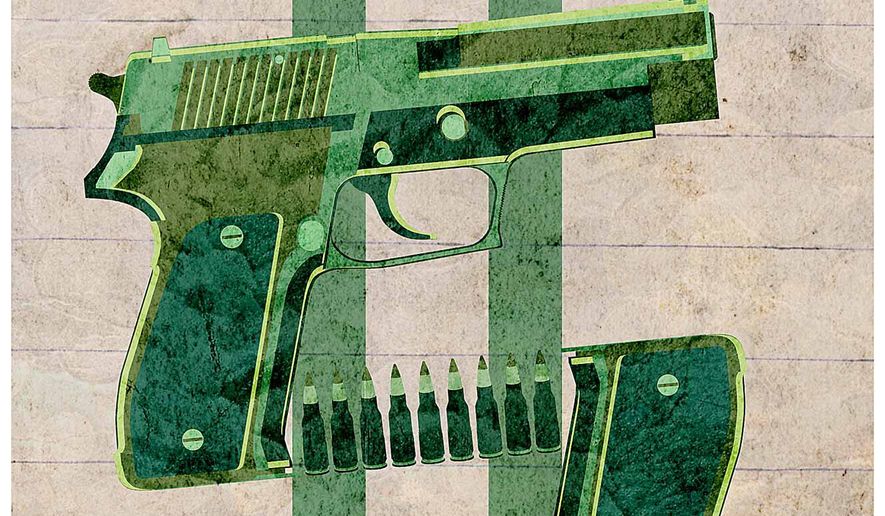OPINION:
Democrats don’t seem to trust poor blacks with guns. It is something that we have seen since at least the end of the Civil War. Yet, it is poor blacks, who are the most likely victims of violent crime who would benefit the most from being able to defend themselves. Unfortunately, this month, the NAACP president Derrick Johnson came out for gun control laws that would leave the most vulnerable defenseless.
The NAACP has become one of the most irrelevant civil rights organizations ever since they abandoned their original mission of civil rights and became a wholly owned subsidiary of the Democratic Party. They now embrace a liberal ideology, including gun control, that is not in the best interest of black civil rights. Name the last piece of relevant civil rights improvements advanced by this organization since Brown v. Board of Education school desegregation case.
As a former sheriff for Milwaukee and a researcher, we know that police are extremely important in stopping crime, but the police themselves understand that they almost always arrive at the crime scene after the crime has occurred. Black communities know all too well the epidemic of gang violence and murder, with blacks accounting for 13 percent of the population but 52 percent of the murder victims.
The people who are the most likely victims of crime are the very ones who benefit the most from being able to defend themselves. While gun control may stop some criminals from getting guns, it is the most law-abiding who obey the law and are disarmed. Taking guns away from drug gangs is about as difficult as stopping them from getting illegal drugs to sell.
Mr. Johnson claims that Australia’s 1996-1997 gun buyback produced supposedly amazing benefits: “gun-related homicides and suicides dropped by 59 percent and 65 percent, respectively.”
If only reducing crime and suicides were so easy.
Australia’s buyback resulted in more than 1 million firearms being handed in and destroyed, reducing gun ownership from 3.2 to 2.2 million guns. But since then there has been a steady increase in the number of privately owned guns. Since 1997, guns ownership grew over 3 times faster than the population (from 2.5 to 5.8 million guns).
Looking at simple before and after averages is extremely misleading. Firearm homicides and suicides were falling from the mid-1980s on, so you could pick any year from the mid-1980s on, not just 199697, and the average firearm homicide and suicide rates after the year you picked would always be lower than the average before it. The question is whether the rate of decline changed after the law went into effect.
Unfortunately, the rate of decline in both firearm homicides and suicides actually fell more slowly after the buyback than it was beforehand.
What gun control advocates should have predicted was a sudden drop in firearm homicides and suicides after the buyback and then an increase as the gun ownership rate increased again. But that clearly didn’t happen.
For other crimes, such as armed robbery, the exact opposite of what was predicted happened. The armed robbery rate soared right after the buyback and then gradually declined.
The problem is that all the fees and licensing requirements as well as the expensive gun safes that are mandated to store the guns means that only the wealthy can afford to own guns in Australia.
When it comes to voting rights, any obstacles outrage liberals; even free government-issued IDs are viewed as disenfranchising poor and disproportionately black people. But when it comes to the right to own a gun for self-defense, liberals already don’t hesitate to pile on fees, ID requirements, expensive training and onerous background checks.
In addition to prohibitive fees, some blue states — California, Illinois — require four times as many training hours as the national average, adding hundreds of dollars to the cost of obtaining a concealed-carry license. In California counties, the mandated cost of training can run from $250 to more than $1,000. Compare heavily Democratic Illinois, where the cost of permit and training runs over $450, with neighboring Republican Indiana where the total cost for everything is $50.
In places such as Washington, D.C. and New York City, background checks on the private transfer of guns cost at least $125. These hurdles amount to a poll tax on gun ownership, the kind of scheme used to prohibit black voters in the Jim Crow south from exercising their constitutional rights. Then they couldn’t afford to vote. Now they can’t afford to own guns.
Police are not omnipresent in America. Indeed, they rarely respond to live crime scenes at all. But sadly for poor people living in the country’s most violent neighborhoods, even the NAACP doesn’t trust them to defend themselves.
• David Clarke Jr. is the president of DACEnterprises.org and the former sheriff for Milwaukee. John Lott Jr. is the president of the Crime Prevention Research Center and the author most recently of “The War on Guns.”




Please read our comment policy before commenting.